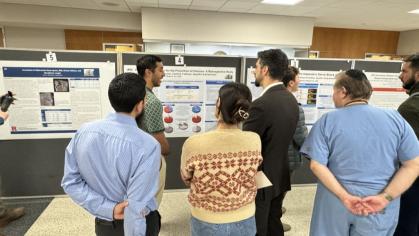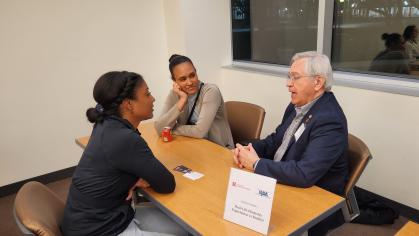Student Leader: Four Trends That Will Affect Dental Students
What are the most important issues facing dental students?
We asked second-year student Chelsea Rajagopalan.
She was recently selected as one of three dental students nationwide to serve on the American Student Dental Association (ASDA) Council on Professional Issues, which explores topics such as dental practice administration, ethics, barriers to care and public health. She encourages students and predental students to join conversations that will change the landscape for themselves and their careers. “It’s imperative that we become educated on the issues and embrace the opportunity to take part in the discussions and decisions being made,’’ she says.
Below is her list of the four most important issues facing dental students.
- Student Debt: The average dental student graduates with $241,000 of debt, and tuition has nearly doubled since 2000. These figures may have an adverse effect on predental students’ decision to pursue dentistry and the career pathways dental students choose upon graduating.
- Licensure: The live patient exam is controversial for a wide variety of reasons, including “ethical and practical questions about the use of human subjects, regional variations in examinations and results, and the reliability and validity of the exams,’’ according to ADEA. In 2005 the ADA announced support for its elimination. Some states, such as New York and California, have adopted alternative paths to licensure, such as the completion of a one-year residency program or a portfolio exam from compiled cases during the fourth year of dental school.
- Midlevel Providers: In an effort to reduce barriers to care, certain states have authorized midlevel providers to perform irreversible dental procedures. Since they aren’t licensed dentists, they aren’t required to attend dental school, but the ADA maintains that only a licensed dentist should perform irreversible dental procedure. An alternative model – the “community dental health coordinator” –is being touted by the ADA to improve oral health education and coordinate care for underserved populations.
- Water Fluoridation: The anti-fluoride movement has been campaigning to prevent towns from adding fluoride to public water supplies or trying to halt existing programs. As dental professionals, we should be prepared to educate the public and promote the continuation and expansion of water fluoridation, which has proven to be one of the most effective and economical ways to prevent tooth decay, and was recognized by the CDC as a top 10 public health achievement of the 20th century.




